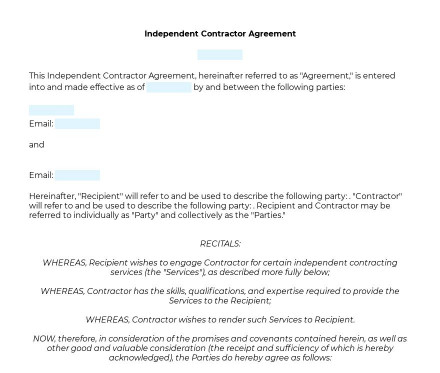Independent Contractor Agreement Free
When two parties, the independent contractor (known as the "contractor") and the recipient of services (known as the "recipient"), wish to enter into a working relationship, they may use this Independent Contractor Agreement.


 Template Overview
Template Overview
When two parties, the independent contractor (known as the "contractor") and the recipient of services (known as the "recipient"), wish to enter into a working relationship, they may avail themselves of this Independent Contractor Agreement. With this agreement, parties agree that the contractor will perform one specific assignment.
These relationships are different from employment relationships because they have separate legal requirements. Legal requirements include the contractor's control levels, location restrictions, etc.
This agreement can be used for any type of contracting services. With this agreement, the contractor and recipient set out the terms of their contractual relationship.
You fill out a form. The document is created before your eyes as you respond to the questions.
At the end, you receive it in Word and PDF formats. You can modify it and reuse it.
 How to use this template
How to use this template
When an independent contractor wants to enter into a relationship with a recipient of services, he can use this contract. The contract may also be used by the recipient of the services to hire an independent contractor.
The document indicates whether the recipient is an individual or a company, as well as the addresses and contact details of the parties. The key features of the parties' agreement and fee information must also be stated in the document.
There will also be general contract provisions included, which cover the state location for any disputes, as well as other standard terms.
A completed document should be printed and signed by both parties. We recommend keeping copies in case any future disputes arise.
 Applicable law
Applicable law
In the US, both Federal and specific state laws govern Independent Contractors. Federal laws may restrict what services can be contracted for (for example, no one may not contract for anything illegal), but individual state laws will generally govern the interpretation of the contract in case of a dispute.
Ready to build your document from this template?



 Please wait
Please wait